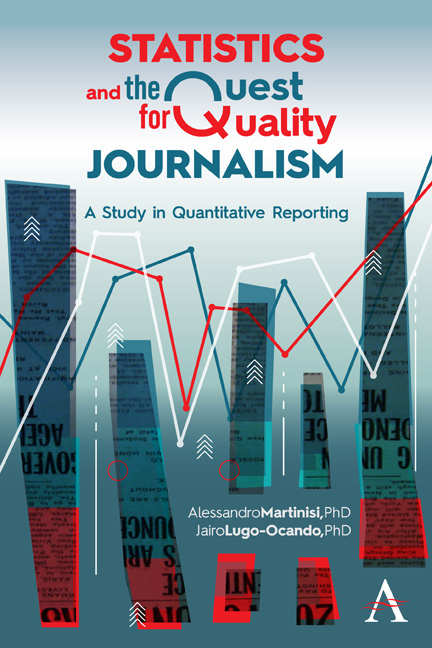Book contents
- Frontmatter
- Dedication
- Contents
- List of Illustrations
- 1 Introduction
- 2 Numbers as Information in the Information Society
- 3 The Never-Ending Debate on Quality in Journalism
- 4 Statistics in Journalism Practice and Principle
- 5 The Normative Importance of ‘Quality’ in Journalism
- 6 Journalism Meets Statistics in Real Life
- 7 The Ideology of Statistics in the News
- Epilogue
- References
- Index
7 - The Ideology of Statistics in the News
Published online by Cambridge University Press: 07 November 2020
- Frontmatter
- Dedication
- Contents
- List of Illustrations
- 1 Introduction
- 2 Numbers as Information in the Information Society
- 3 The Never-Ending Debate on Quality in Journalism
- 4 Statistics in Journalism Practice and Principle
- 5 The Normative Importance of ‘Quality’ in Journalism
- 6 Journalism Meets Statistics in Real Life
- 7 The Ideology of Statistics in the News
- Epilogue
- References
- Index
Summary
Over the past years, governments and corporations have come to develop media strategies to ‘manage’ the dissemination of statistics within the public. As we have discussed in this book, this was part of a long history in using numbers to assert social control and that in the twentieth century took the form of cybernetics. In more recent times, this has meant enshrining statistics and data into daily life by means of the information and communication technologies to be used by individuals, couples, families and communities. In so doing, they have dedicated immense resources towards ‘controlling’ narratives and interpretations of statistics released in the public sphere.
Moreover, mediatization practices to shape the way these numbers go out into the public are now at the centre of the controversies and issues that journalism confronts. This ‘mediatization of statistics communication’ (Lugo-Ocando & Lawson, 2017) is one which is understood to be not a policy-making process directed by the media but overall a policy-process in which publicityseeking activities and political decision-making become closely interlinked (Cater, 1965; T. Cook, 2005).
Statistics are far from being a neutral object in society and have their own politics and ideologies. They are also fundamental signifiers in the creation of social reality (Dorling & Simpson, 1999), displaying a politics of their own. Not that we ascribe agency to the output of a mathematical equation but that we see the equation itself as a human creation that has a history, a meaning and an intent. Over the years, as we have seen in this book, these numbers have gained a power of their own. From defining budgetary priorities to determining who can receive aid or buy a house, statistics and data, in more general terms, dominate human existence in many ways.
However, with the increasing presence of Big Data and controlling power of algorithms, we are entering into new uncharted territory, No longer is it just about the state or corporations controlling the production and analysis of statistics, but also about the active management of these numbers by means of mediated representation in the public domain. Recognized today as a process
- Type
- Chapter
- Information
- Statistics and the Quest for Quality JournalismA Study in Quantitative Reporting, pp. 153 - 170Publisher: Anthem PressPrint publication year: 2020



